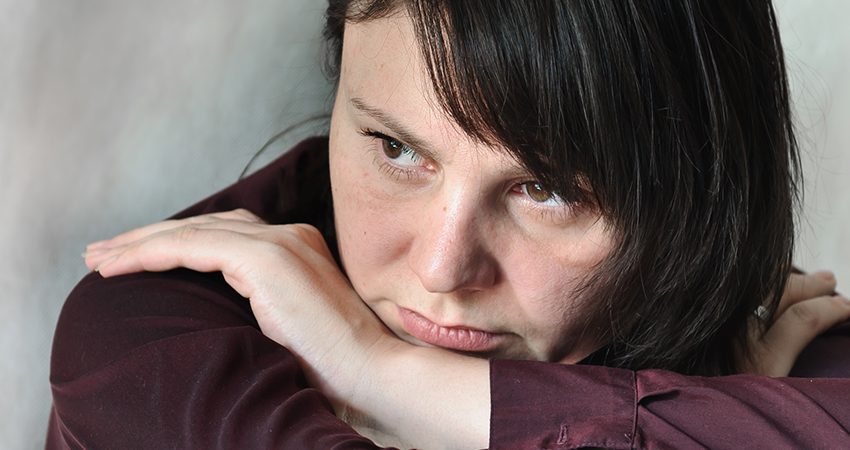Did your uterine fibroids bring on depression?
If you are a woman living with uterine fibroids, one of the symptoms you may be experiencing is depression. While it is still unclear exactly what may be the causative link between the two conditions, enough women experience the two disabling conditions simultaneously to warrant further studies.
Anywhere from 20 to 80 percent of women of child-bearing age develop uterine fibroids before their 50th birthday. As women approach perimenopause, the risk of developing fibroids increases. Some women who have fibroids remain asymptomatic, and their conditions are only revealed during routine physical examinations. Other women experience a plethora of symptoms, some of which may be quite disabling and may include the following:
- Painful, heavy periods
- Urinary retention or frequency
- Rectal pressure
- Abdominal pain and swelling
- Sexual dysfunction and painful intercourse
Do fibroids cause depression, or does depression lead to fibroids?
When you are truly suffering from the effects of uterine fibroids, the “chicken or the egg” question doesn’t really matter all that much. It is easy to see how a woman trying to cope with the everyday stressors of life while dealing with the complications of uterine fibroids could become overwhelmed and depressed.
Heavy, painful periods that last longer than a few days or a week can sap a woman’s energy and leave her physically drained. Pain during intercourse can slam the door on intimacy, which can in turn have a trickle-down effect on a woman’s relationship with her spouse or partner. Dealing with urinary frequency can make life much more difficult, as women may curtail exercise routines or other enjoyable activities out of a fear of not being able to “hold it” until they can get to a bathroom. Conversely, if a fibroid is applying pressure to the ureters, a woman might not be able to void her urine and may even need to be catheterized. When you consider all of the above, it’s no wonder that depression and uterine fibroids are often a co-diagnoses.
The flip side of the depression/fibroid coin
At least one segment of the population — African-American women — has been the focus to examine the role of depression and other mental health conditions in uterine fibroid development.
A research team from Boston University studied nearly 16,000 women of childbearing age who were participants in a Black Women’s Health Study. The team conducted an analysis of the group’s medical statistics and published their findings in the American Journal of Obstetrics and Gynecology in 2012.
During separate periods in the past two decades, researchers provided questionnaires utilizing the depression scale from the Center for Epidemiologic Studies to women in the group in order to assess and evaluate any symptoms they manifested that were linked to depression.
Then, over a dozen-year period, they requested that the women follow up with surveys every other year. These surveys asked questions that included:
- Had they gotten a diagnosis of fibroids via surgery or ultrasound?
- Were they diagnosed by a physician or mental health professional as being depressed?
- Were they prescribed, and did they take, any antidepressants?
Of those women surveyed, there were 4,722 who were diagnosed with uterine fibroids during the study. Of that group, researchers noted that the higher the risk for depression, the greater likelihood of an enhanced risk for the development of uterine fibroids.
The science behind the link
Researchers hypothesized that this link between co-diagnoses of uterine fibroids and depression has to do with the hypothalamic-pituitary-adrenal axis. While the full role of the HPA axis is out of the breadth and scope of this post, suffice it to say that this axis is part of the human body’s internal communication system that regulates one’s response to stress and other emotions.
When the HPA axis goes out of whack, the stress response intensifies, altering moods and potentially causing depression. Additionally, hormone processing can be affected by depression; it’s been found that when women have higher progesterone levels, there is more rapid growth of uterine fibroids.
Another possible cause — the onset of menopause?
Menopause and perimenopause bring many changes to a woman’s body. While some women may be relieved to no longer have to worry about birth control and periods, others mourn the loss of their fertility that accompanies this transition. For those women, the stressors of aging and coping with the physical and psychological implications of menopause can induce stress that can easily segue right into depression before the women are able to get a handle on their emotions.
Whatever the science is behind the dual diagnoses, there is no need for any woman to soldier on while struggling to manage two debilitating conditions. In the past, many gynecologists recommended that their patients who were truly suffering undergo partial or even complete hysterectomies. Yet surgical menopause can bring its own set of complications and side effects that many women prefer to avoid entirely. There is also a risk to any major surgery where a general anesthesia is used, and surgeons tend to err on the side of caution in these types of medical situations.
Choosing a less invasive treatment for relief
If you are a woman suffering with both depression and uterine fibroids, you will be glad to learn that there are remedies out there that do not require either a partial or complete hysterectomy. Fibroid embolizations block the pathways to the blood vessels that feed the fibroids and cause them to increase in size. Without the infusion of life-sustaining blood, the fibroids wither and die without the woman ever having to be subjected to major invasive procedures.
If you are concerned about your depression and fibroid risks, a fibroid embolization might be the best treatment for you. To schedule a free consultation with leading surgeons who perform this procedure, call (866) 479-1523 to learn more.


